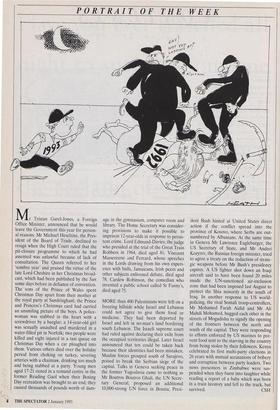PORTRAIT OF THE WEEK
Mr Tristan Garel-Jones, a Foreign Office Minister, announced that he would leave the Government this year for person- al reasons. Mr Michael Heseltine, the Pres- ident of the Board of Trade, declined to resign when the High Court ruled that the pit-closure programme to which he had assented was unlawful because of lack of consultation. The Queen referred to her 'sombre year' and praised the virtue of the late Lord Cheshire in her Christmas broad- cast, which had been published by the Sun some days before in defiance of convention. The sons of the Prince of Wales spent Christmas Day apart from their mother at the royal party at Sandringhani; the Prince and Princess's Christmas card had carried an unsmiling picture of the boys. A police- woman was stabbed in the heart with a screwdriver by a burglar; a 14-year-old girl was sexually assaulted and murdered in a water-filled pit in Norfolk; two people were killed and eight injured in a taxi queue on Christmas Day when a car ploughed into them. Various others died over the holiday period from choking on turkey, severing arteries with a chainsaw, drinking too much and being stabbed at a party. Young men aged 17-21 rioted in a remand centre in the former Reading Gaol when their Boxing Day recreation was brought to an end; they caused thousands of pounds worth of dam-
age in the gymnasium, computer room and library. The Home Secretary was consider- ing provisions to make it possible to imprison 12-year-olds in response to persis- tent crime. Lord Edmund-Davies, the judge who presided at the trial of the Great Train Robbers in 1964, died aged 85. Viscount Massereene and Ferrard, whose speeches in the Lords drawing from his own experi- ence with bulls, Jamaicans, Irish peers and other subjects enlivened debate, died aged 78. Cardew Robinson, the comedian who invented a public school called St Fanny's, died aged 75.
MORE than 400 Palestinians were left on a freezing hillside while Israel and Lebanon could not agree to give them food or medicine. They had been deported by Israel and left in no-man's land bordering south Lebanon. The Israeli supreme court had ruled against declaring their exile from the occupied territories illegal. Later Israel announced that ten could be taken back because their identities had been mistaken. Muslim forces grouped south of Sarajevo, poised to break the Serbian siege of the capital. Talks in Geneva seeking peace in the former Yugoslavia came to nothing as Mr Boutros Boutros Ghali, the UN Secre- tary General, proposed an additional 10,000-strong UN force in Bosnia; Presi- dent Bush hinted at United States direct action if the conflict spread into the province of Kosovo, where Serbs are out- numbered by Albanians. At the same time in Geneva Mr Lawrence Eagleburger, the US Secretary of State, and Mr Andrei Kozyrev, the Russian foreign minister, tried to agree a treaty on the reduction of strate- gic weapons before Mr Bush's presidency expires. A US fighter shot down an Iraqi aircraft said to have been found 20 miles inside the UN-sanctioned air-exclusion zone that had been imposed last August to protect the Shia minority in the south of Iraq. In another response to US world- policing, the rival Somali troop-controllers, Mr Mohamed Farah Aidid and Mr Ali Mahdi Mohamed, hugged each other in the streets of Mogadishu to signify the opening of the frontiers between the north and south of the capital. They were responding to efforts enforced by US marines to pre- vent food sent to the starving in the country from being stolen by their followers. Kenya celebrated its first multi-party elections in 26 years with mutual accusations of bribery and corruption between party leaders. Two news presenters in Zimbabwe were sus- pended when they burst into laughter while reading a report of a baby which was born in a train lavatory and fell to the track, but










































 Previous page
Previous page